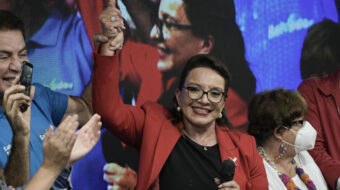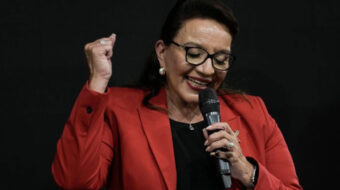Police with clubs and tear gas attempting to disperse protesting small farmers in Lower Aguan, Honduras detained 25 of them on Aug. 21, releasing them after 24 hours with warnings against further agitation. Reports of such repression and human rights abuses became routine following the 2009 military coup that removed President Mel Zelaya, caused Honduras to leave the ALBA solidarity alliance, and muffled pre-coup discussion of a new constitution.
It was clear too that corporate interests were prioritized and that ties with the U.S. military were re-established.
Yet plans for solidifying long-term elite advantages have received less attention than any of this. That may change if a plea placed before the Supreme Judicial Court by a citizens group on Sept. 12 means anything.
The court was asked to rule that legislation promoting “Special Development Regions” (RED, in Spanish) is unconstitutional and to declare that proponents had committed treason. The government was accused of ceding national sovereignty to foreign investors. Government secrecy was condemned, as was lack of consultation with affected populations.
The RED plan, commonly referred to as the “model cities” program, is aimed at securing control of people and land. Under the plan proposed by President Porfirio Lobo and approved by the Congress in early 2011, RFD territories will have “their own judicial make-up, their own jurisdictional privilege, their own administrative system,…their own budget and right to collect taxes…and right to make any kind of contract.”
The Commission for Promotion of Public-Private Alliances recently signed an agreement with the U.S. MKG consortium to build the “first model city in the fertile Sula Valley.” U.S. economist Paul Romer, said by one observer “to aspire to replace [Milton] Friedman on the road to reproduction of capitalism,” is widely viewed as the intellectual author of the RED concept of autonomous territories.
Then there is the government’s “National Program of Hourly Employment” that became law in November 2011. Rationalized as creating jobs but seen ultimately as bolstering Honduras’ long-term hospitality to corporate investment, especially from abroad, the legislation prescribes a 20 percent minimum wage elevation and opens the door for individual companies to use temporary laborers under contract to make up 40 percent of their work forces. Critics see the law as a major blow against job security and union organizing.
A comprehensive mining bill proposed years before the coup, one that foreign mining corporations have sought and that has not yet become law ought to warrant government leaders’ full attention, given their ties to international capitalism. Yet the effort has proceeded in low gear. The government has sought approval from already employed mineworkers by offering to increase their benefits, and mining companies have wooed rural residents by offering them land and money.
Urgency may be lacking because, in fact, mining operations are well established; in 2009, 315 mining concessions were being explored and another 57 were being mined. And multi-national companies may object to further meddling in view of low taxes they pay. In the five years prior to 2009, mining companies contributed only six percent of their earnings as taxes. They paid 20 percent in taxes to the Spanish colonial government, says analyst Ollanty Itzama.
An expanding bio-fuel industry in Lower Aguan based on African Palm plantations became emblematic of corporate free rein characterizing post-coup Honduras. Miguel Facussé and other entrepreneurial landowners helped plan the anti-Zelaya coup. They use private security forces, notorious for violence, to remove land – hungry small farmers from acreage they claim under President Zelaya’s modest land reform program.
Small farmers so mobilized are not alone in protesting the new order in Honduras. Resistance is also cropping up against these government projects aimed at solidifying elite power. Xiomara Castro, presidential candidate for the new LIBRE Party, recently issued a call for the model cities legislation to be submitted to a nationwide popular referendum. Created by the National Front for Popular Resistance (FNRP), which became the leading force opposing the coup, the LIBRE Party mobilizes under the slogan “Socialism is Independence.”
On Sept. 15, Honduras’ three labor federations issued a joint statement condemning the “Plan for Hourly Employment.” The unionists claim workers will lose guarantees provided under the country’s labor code. In a message of support, the FNRP denounced the legislation as depriving workers “of the essential stability that union affiliation provides.”
And whatever the fate of the contested and still pending mining law, indigenous and small farmer groups, joined by environmental organizations, are out in force to defend land, the environment, and people’s rights against both mining companies and the government.

MOST POPULAR TODAY

High Court essentially bans demonstrations, freedom of assembly in Deep South

Zionist organizations leading campaign to stop ceasefire resolutions in D.C. area

UN warns that Israel is still blocking humanitarian aid to Gaza

U.S. imperialism’s ‘ironclad’ support for Israel increases fascist danger at home






Comments